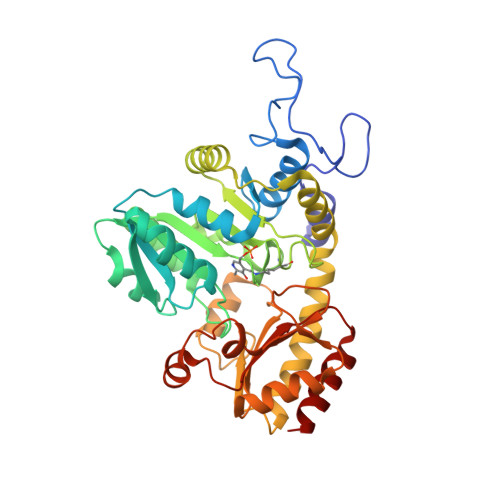Inhibitors of bacterial H 2 S biogenesis targeting antibiotic resistance and tolerance.
Shatalin, K., Nuthanakanti, A., Kaushik, A., Shishov, D., Peselis, A., Shamovsky, I., Pani, B., Lechpammer, M., Vasilyev, N., Shatalina, E., Rebatchouk, D., Mironov, A., Fedichev, P., Serganov, A., Nudler, E.(2021) Science 372: 1169-1175
- PubMed: 34112687
- DOI: https://doi.org/10.1126/science.abd8377
- Primary Citation of Related Structures:
7MCB, 7MCL, 7MCN, 7MCP, 7MCQ, 7MCT, 7MCU, 7MCY, 7MD0, 7MD1, 7MD6, 7MD8, 7MD9, 7MDA, 7MDB - PubMed Abstract:
Emergent resistance to all clinical antibiotics calls for the next generation of therapeutics. Here we report an effective antimicrobial strategy targeting the bacterial hydrogen sulfide (H 2 S)-mediated defense system. We identified cystathionine γ-lyase (CSE) as the primary generator of H 2 S in two major human pathogens, Staphylococcus aureus and Pseudomonas aeruginosa , and discovered small molecules that inhibit bacterial CSE. These inhibitors potentiate bactericidal antibiotics against both pathogens in vitro and in mouse models of infection. CSE inhibitors also suppress bacterial tolerance, disrupting biofilm formation and substantially reducing the number of persister bacteria that survive antibiotic treatment. Our results establish bacterial H 2 S as a multifunctional defense factor and CSE as a drug target for versatile antibiotic enhancers.
- Department of Biochemistry and Molecular Pharmacology, New York University School of Medicine, New York, NY 10016, USA.
Organizational Affiliation:




















